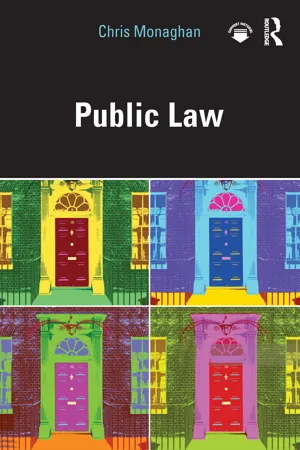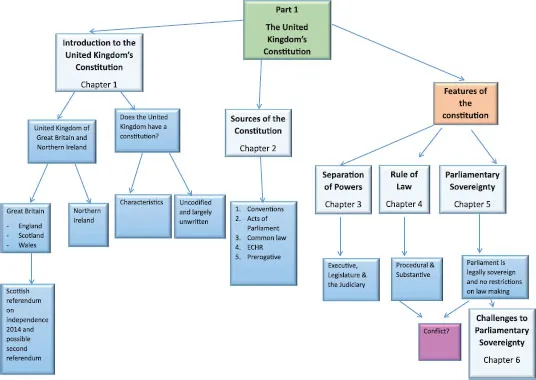
- 740 pages
- English
- ePUB (mobile friendly)
- Available on iOS & Android
Public Law
About this book
Public Law guides students through all the essential components of the Public Law module, in a user-friendly structure that is ideal for visual learners.
Written by an experienced teacher of Public Law, the book takes an accessible and engaging approach to often complex areas of law, politics and the constitution. Incorporating recent developments, academic debate and commentary, the book introduces students to all the key concepts of this core subject. The text is grounded in context, explaining how Public Law operates in practice, and it thoroughly covers the spectrum of Constitutional Law, Human Rights and Administrative Law.
Integrated pedagogic features ease navigation of the text and reinforce key points. These include Public Law in Context, Recent Developments, Public Law in Practice, Practical Application and Academic Debate, and Public Law is also supported by online Multiple Choice Questions.
Public Law is essential reading for modules on public law and constitutional and administrative law on LLB degrees and conversion courses.
Tools to learn more effectively

Saving Books

Keyword Search

Annotating Text

Listen to it instead
Information
Part 1
The United Kingdom’s constitution

1 The United Kingdom’s constitution
- define what is meant by a constitution;
- consider the nature of the United Kingdom’s constitution;
- explore the history and the key constitutional developments of the United Kingdom; and
- consider the academic debate over whether the United Kingdom has a constitution.
Before you begin
1.1 Introduction
- What does Parliamentary Sovereignty mean within the United Kingdom’s constitution and what will happen to the powers and ‘sovereignty’ repatriated from the European Union?
- Should Members of Parliament (MPs) vote to give effect to the people’s decision (via the 2016 referendum) to leave the European Union, or do MPs in a representative democracy have the right to put the national interest over a non-binding advisory referendum?
- Should referendums be used to decide important constitutional questions given the seriousness of the decision and the resulting difficulty in the government reaching a position that could gain the support of the House of Commons?
- Are the judges really the ‘Enemies of the People’1 for holding that the government does not have the prerogative power to trigger Article 50 without parliamentary approval? The last question is important as the decision in R (on the application of Miller) v Secretary of State for Exiting the European Union (Miller No. 1)2 is upholding the constitution and therefore this raises interesting issues regarding a clash between the constitution and popular opinion.
- Does the fact that a majority of the people of Scotland voted to remain within the European Union give support for greater devolution of legislative powers to the Scottish Parliament and possibly independence, which would then permit Scotland to reapply to join the European Union?
- What will be the long-term constitutional and political implications for Northern Ireland as part of the United Kingdom, given that it shares a land border with the European Union?
We the People of the United States, in Order to form a more perfect Union, establish Justice, insure domestic Tranquility, provide for the common defence, promote the general Welfare, and secure the Blessings of Liberty to ourselves and our Posterity, do ordain and establish this Constitution for the United States of America.3
Public Law in context
not every country with a ‘democratic’ constitution is a democracy
Comrade Kim Il Sung regarded ‘believing in the people as in heaven’ as his motto, was always with the people, devoted his whole life to them, took care of and guided them with a noble politics of benevolence, and turned the whole society into one big and united family.The great leader Comrade Kim Il Sung is the sun of the nation and the lodestar of the reunification of the fatherland. Comrade Kim Il Sung set the reunification of the country as the nation’s supreme task, and devoted all his work and endeavors entirely to its realization.’8
| Important constitutional principle | Historically it was unwritten | Today it is written |
|---|---|---|
| The Prime Minister’s ability to call a general election. | Historically unwritten as a constitutional convention. | This is now written as the rules about calling a general election are outlined in the Fixed-term Parliaments Act 2011. Please note the Fixed-term Parliaments Act 2011 will soon be repealed. |
| Holding a vote of no confidence in the government. | Historically unwritten as a constitutional convention. | This is now written as the rules about votes of no confidence are fou... |
Table of contents
- Cover
- Half Title Page
- Title Page
- Copyright Page
- Contents
- Preface
- Table of Cases
- European Legislation
- Table of Statutes
- Part 1 The United Kingdom’s constitution
- Part 2 The three branches of government
- Index
Frequently asked questions
- Essential is ideal for learners and professionals who enjoy exploring a wide range of subjects. Access the Essential Library with 800,000+ trusted titles and best-sellers across business, personal growth, and the humanities. Includes unlimited reading time and Standard Read Aloud voice.
- Complete: Perfect for advanced learners and researchers needing full, unrestricted access. Unlock 1.4M+ books across hundreds of subjects, including academic and specialized titles. The Complete Plan also includes advanced features like Premium Read Aloud and Research Assistant.
Please note we cannot support devices running on iOS 13 and Android 7 or earlier. Learn more about using the app